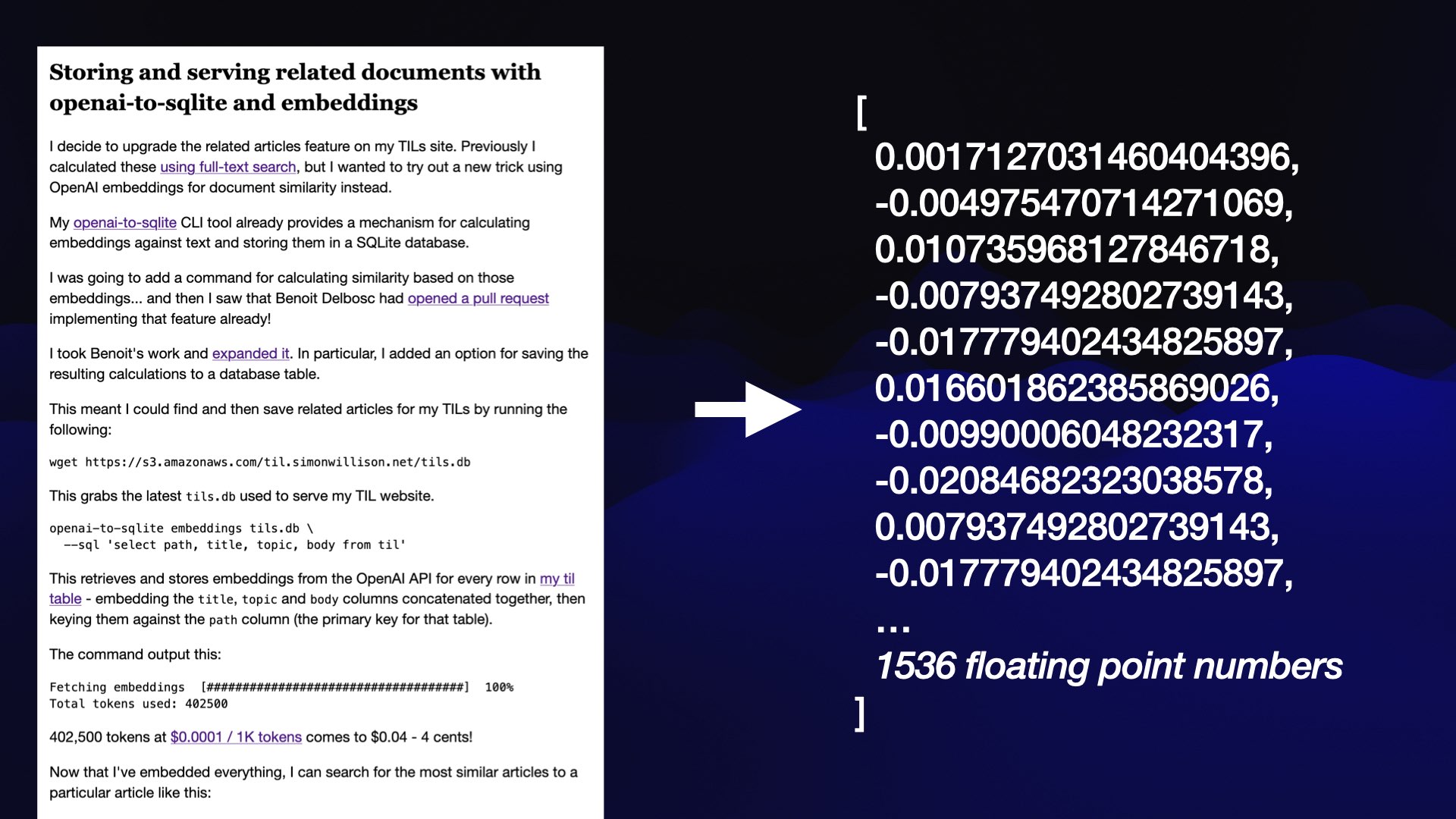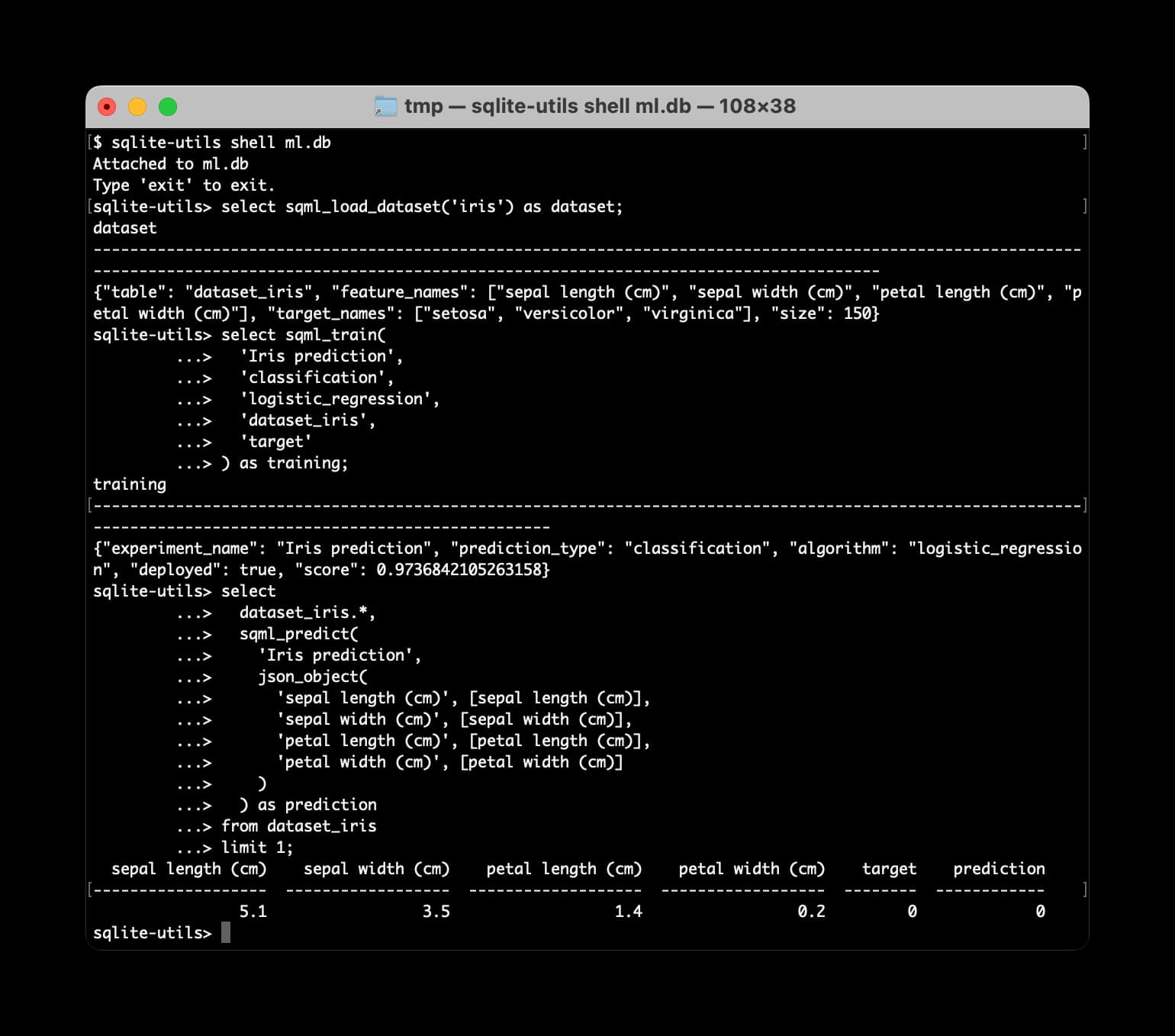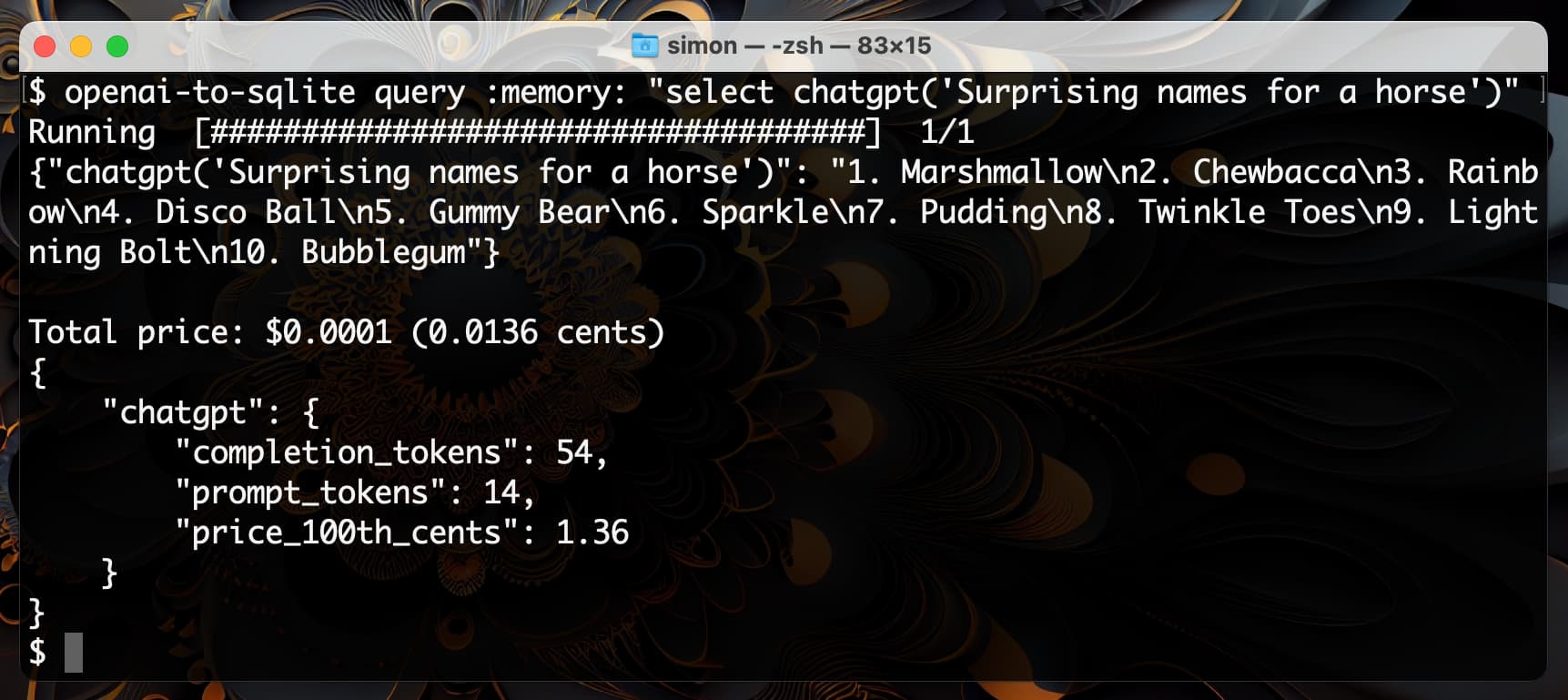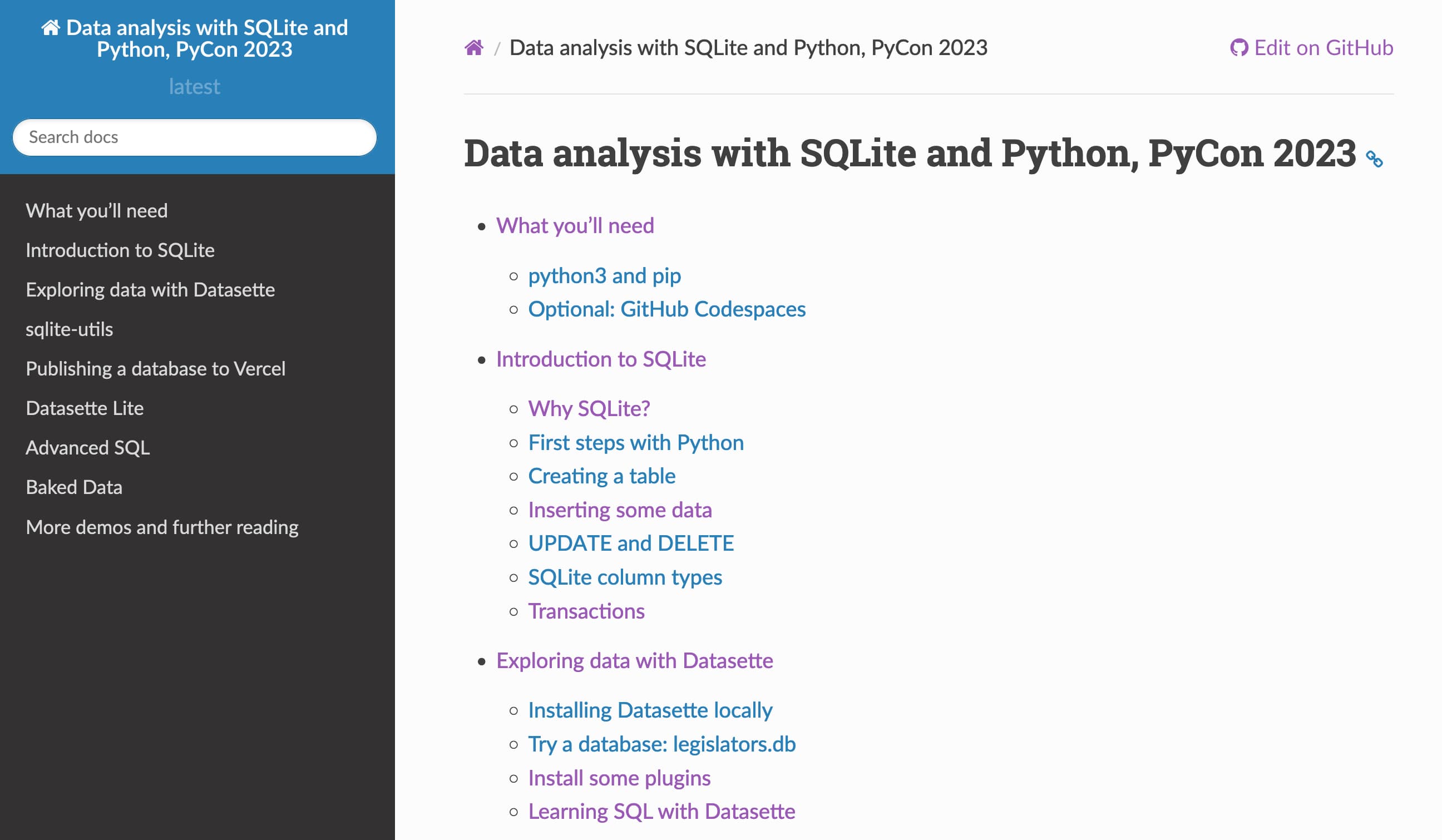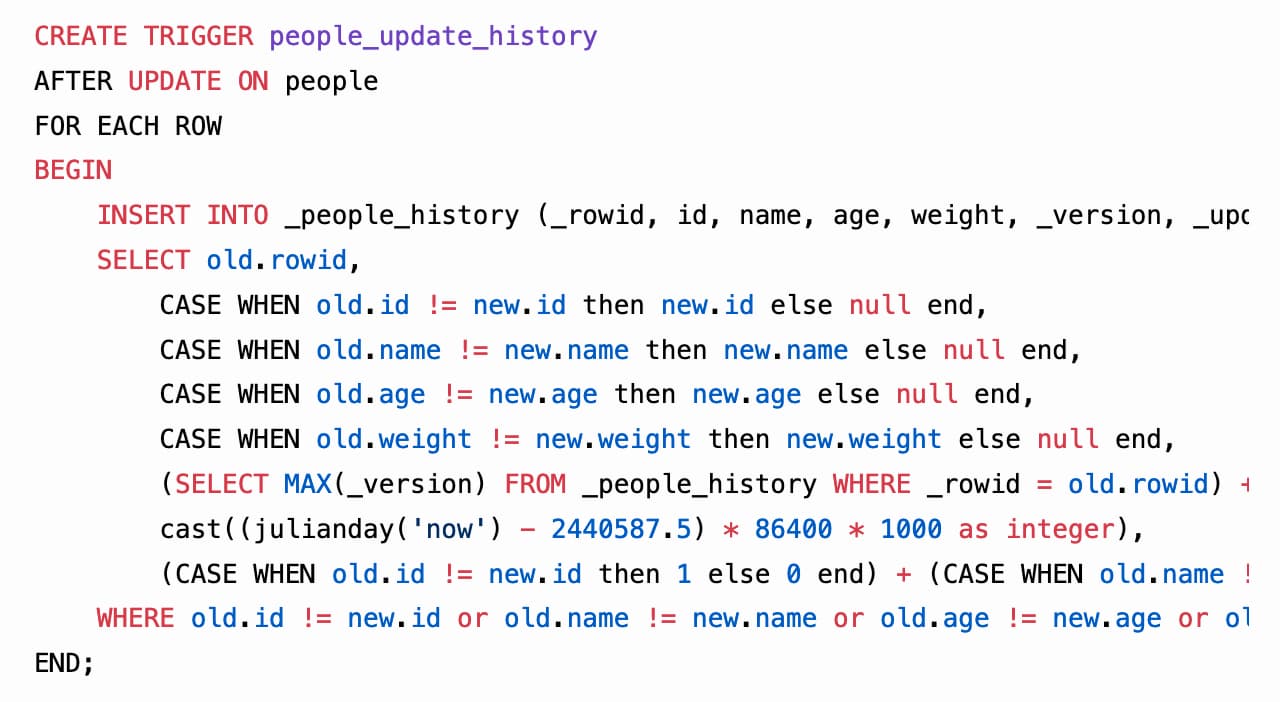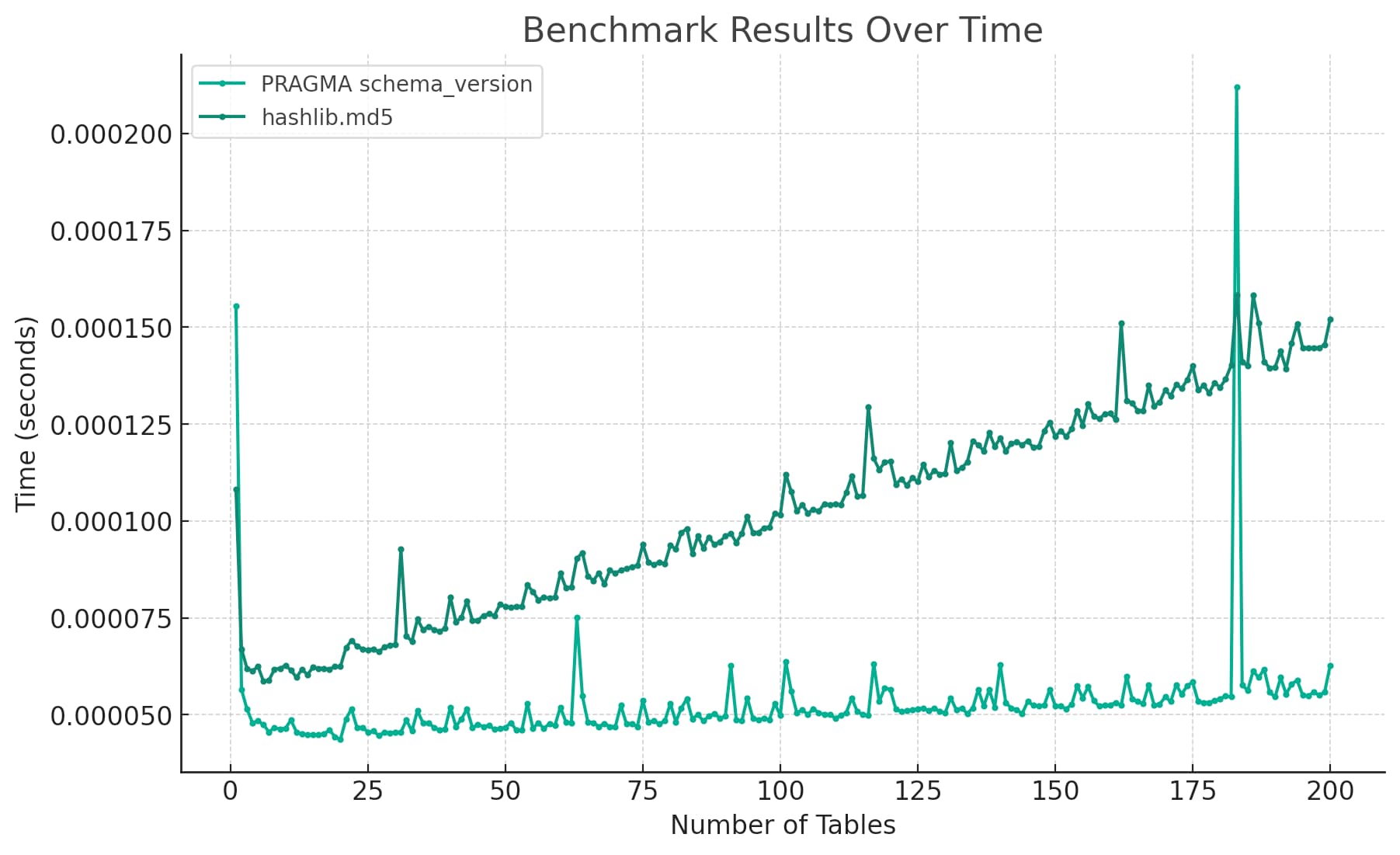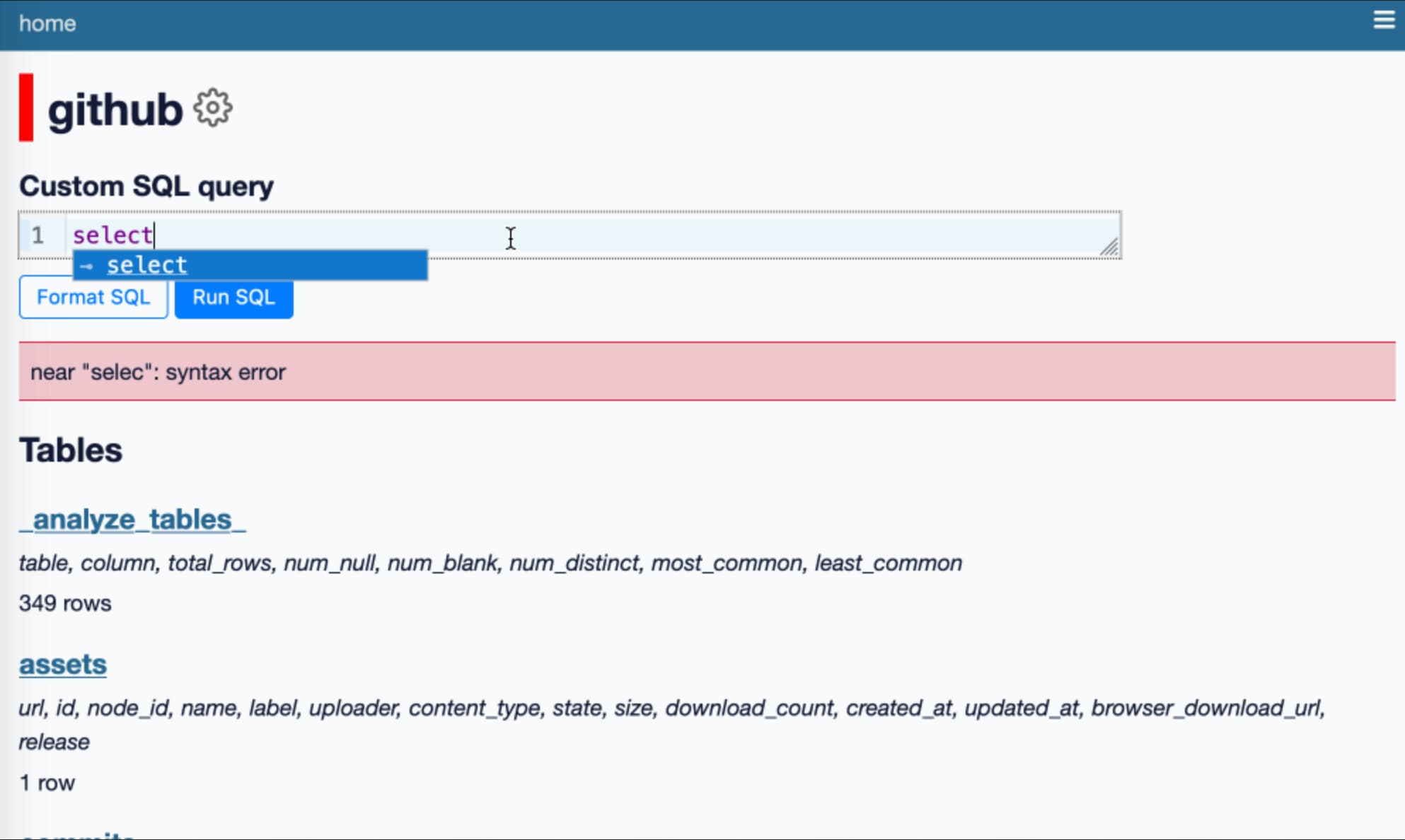308 posts tagged “sqlite”
SQLite is the world's most widely deployed database engine.
2023
LLM now provides tools for working with embeddings
LLM is my Python library and command-line tool for working with language models. I just released LLM 0.9 with a new set of features that extend LLM to provide tools for working with embeddings.
[... 3,521 words]Queryable Logging with Blacklite (via) Will Sargent describes how he built Blacklite, a Java library for diagnostic logging that writes log events (as zstd compressed JSON objects) to a SQLite database and maintains 5,000 entries in a “live” database while entries beyond that range are cycled out to an archive.db file, which is cycled to archive.timestamp.db when it reaches 500,000 items.
Lots of interesting notes here on using SQLite for high performance logging.
“SQLite databases are also better log files in general. Queries are faster than parsing through flat files, with all the power of SQL. A vacuumed SQLite database is only barely larger than flat file logs. They are as easy to store and transport as flat file logs, but work much better when merging out of order or interleaved data between two logs.”
Dependency Management Data (via) This is a really neat CLI tool by Jamie Tanna, built using Go and SQLite but with a feature that embeds a Datasette instance (literally shelling out to start the process running from within the Go application) to provide an interface for browsing the resulting database.
It addresses the challenge of keeping track of the dependencies used across an organization, by gathering them into a SQLite database from a variety of different sources—currently Dependabot, Renovate and some custom AWS tooling.
The “Example” page links to a live Datasette instance and includes video demos of the tool in action.
sqlite-utils now supports plugins
sqlite-utils 3.34 is out with a major new feature: support for plugins.
[... 1,327 words]sqlite-vss v0.1.1 Annotated Release Notes (via) Alex Garcia’s sqlite-vss adds vector search directly to SQLite through a custom extension. It’s now easily installed for Python, Node.js, Deno, Elixir, Go, Rust and Ruby (“gem install sqlite-vss”), and is being used actively by enough people that Alex is getting actionable feedback, including fixes for memory leaks spotted in production.
Data analysis with SQLite and Python. I turned my 2hr45m workshop from PyCon into the latest official tutorial on the Datasette website. It includes an extensive handout which should be useful independently of the video itself.
sqlean.py: Python’s sqlite3 with extensions. Anton Zhiyanov built a new Python package which bundles a fresh, compiled copy of SQLite with his SQLean family of C extensions built right in. Installing it gets you the latest SQLite—3.42.0—with nearly 200 additional functions, including things like define() and eval(), fileio_read() and fileio_write(), percentile_95() and uuid4() and many more. “import sqlean as sqlite3” works as a drop-in replacement for the module from the standard library.
Vector Search. Amjith Ramanujam provides a very thorough tutorial on implementing vector similarity search using SentenceTransformers embeddings (all-MiniLM-L6-v2) executed using sqlite-utils, then served via datasette-sqlite-vss and deployed using Fly.
SQLite 3.42.0.
The latest SQLite has a tiny feature I requested on the SQLite Forum - SELECT unixepoch('subsec') now returns the current time in milliseconds since the Unix epoch, a big improvement on the previous recipe of select cast((julianday('now') - 2440587.5) * 86400 * 1000 as integer)!
Also in the release: JSON5 support (JSON with multi-line strings and comments), a bunch of improvements to the query planner and CLI tool, plus various interesting internal changes.
Big Opportunities in Small Data
I gave an invited keynote at Citus Con 2023, the PostgreSQL conference. Below is the abstract, video, slides and links from the presentation.
[... 385 words]Enriching data with GPT3.5 and SQLite SQL functions
I shipped openai-to-sqlite 0.3 yesterday with a fun new feature: you can now use the command-line tool to enrich data in a SQLite database by running values through an OpenAI model and saving the results, all in a single SQL query.
[... 1,219 words]Data analysis with SQLite and Python for PyCon 2023
I’m at PyCon 2023 in Salt Lake City this week.
[... 347 words]sqlite-history: tracking changes to SQLite tables using triggers (also weeknotes)
In between blogging about ChatGPT rhetoric, micro-benchmarking with ChatGPT Code Interpreter and Why prompt injection is an even bigger problem now I managed to ship the beginnings of a new project: sqlite-history.
[... 1,680 words]Replacing my best friends with an LLM trained on 500,000 group chat messages (via) Izzy Miller used a 7 year long group text conversation with five friends from college to fine-tune LLaMA, such that it could simulate ongoing conversations. They started by extracting the messages from the iMessage SQLite database on their Mac, then generated a new training set from those messages and ran it using code from the Stanford Alpaca repository. This is genuinely one of the clearest explanations of the process of fine-tuning a model like this I’ve seen anywhere.
Running Python micro-benchmarks using the ChatGPT Code Interpreter alpha
Today I wanted to understand the performance difference between two Python implementations of a mechanism to detect changes to a SQLite database schema. I rendered the difference between the two as this chart:
[... 2,939 words]Making SQLite extensions npm install’able for Node.js, and on deno.land/x for Deno (via) Alex Garcia figured out how to get his “pip install X” trick for distributing compiled SQLite extensions to work for Node too! Now you can “npm install” 10 of his extensions, including sqlite-regex and sqlite-xsv and sqlite-http and sqlite-html and more, and attach them to a node-sqlite3 or better-sqlite3 connection. He’s bundled them for Deno too!
apple-notes-to-sqlite (via) With the help of ChatGPT I finally figured out just enough AppleScript to automate the export of my notes to a SQLite database. AppleScript is a notoriously read-only language, which is turns out makes it a killer app for LLM-assisted coding.
Online gradient descent written in SQL (via) Max Halford trains an online gradient descent model against two years of AAPL stock data using just a single advanced SQL query. He built this against DuckDB—I tried to replicate his query in SQLite and it almost worked, but it gave me a “recursive reference in a subquery” error that I was unable to resolve.
djngo.com: Portable Django (via) “A 20mb executable zip file with Python 3.6 and Django 2.2. Works on Windows, Linux, MacOSX with x86_64 and aarch64 (yes, Apple M1 and Raspberry Pi).” The latest wizardry from the ecosystem surrounding the Cosmopolitan project, which provides a should-be-impossible mechanism for running the same executable on a bunch of different platforms. This utility by Ariel Núñez bundles Python and Django and SQLite, such that a Django application can become a portable executable ready to run on multiple platforms. It’s currently limited to Python 3.6 and Django 2.2 since those are the versions that run under Cosmopolitan, but I expect we’ll see more recent versions of those dependencies in the future.
Introducing sqlite-vss: A SQLite Extension for Vector Search (via) This latest SQLite extension from Alex Garcia is possibly his best yet: it adds FAISS-powered vector similarity search directly to SQLite, enabling fast KNN similarity lookups against a virtual table that feels a lot like SQLite’s own built-in full text search feature. This write-up includes interactive demos using Datasette called from an Observable notebook, running similarity searches against an index of 200,000 news headlines and summaries in less than 50ms.
Weeknotes: A bunch of things I learned this week, plus datasette-explain
The Datasette table view refactor, JSON redesign and ?_extra= continues this week, mainly in this ongoing pull request and this tracking issue.
Many people, and even a few companies, have contributed code to SQLite over the years. I have legal documentation for all such contributions in the firesafe in my office. We are able to track every byte of the SQLite source code back to its original creator. The project has been and continues to be open to outside contributions, as long as those contributions meet high standards of provenance and maintainability.
Making SQLite extensions pip install-able (via) Alex Garcia figured out how to bundle a compiled SQLite extension in a Python wheel (building different wheels for different platforms) and publish them to PyPI. This is a huge leap forward in terms of the usability of SQLite extensions, which have previously been pretty difficult to actually install and run. Alex also created Datasette plugins that depend on his packages, so you can now “datasette install datasette-sqlite-regex” (or datasette-sqlite-ulid, datasette-sqlite-fastrand, datasette-sqlite-jsonschema) to gain access to his custom SQLite extensions in your Datasette instance. It even works with “datasette publish --install” to deploy to Vercel, Fly.io and Cloud Run.
sqlite-jsonschema. “A SQLite extension for validating JSON objects with JSON Schema”, building on the jsonschema Rust crate. SQLite and JSON are already a great combination—Alex suggests using this extension to implement check constraints to validate JSON columns before inserting into a table, or just to run queries finding existing data that doesn’t match a given schema.
sqlite-ulid. Alex Garcia’s sqlite-ulid adds lightning-fast SQL functions for generating ULIDs—Universally Unique Lexicographically Sortable Identifiers. These work like UUIDs but are smaller and faster to generate, and can be canonically encoded as a URL-safe 26 character string (UUIDs are 36 characters). Again, this builds on a Rust crate—ulid-rs—and can generate 1 million byte-represented ULIDs with the ulid_bytes() function in just 88.4ms.
sqlite-fastrand. Alex Garcia just dropped three new SQLite extensions, and I’m going to link to all of them. The first is sqlite-fastrand, which adds new functions for generating random numbers (and alphanumeric characters too). Impressively, these out-perform the default SQLite random() and randomblob() functions by about 1.6-2.6x, thanks to being built on the Rust fastrand crate which builds on wyhash, an extremely fast (though not cryptographically secure) hashing function.
[On SQLite for production concurrent writes] In general, WAL mode “just works” as Simon said. You just need to make sure you don’t have long running write transactions, although those are somewhat problematic in any database system. Don’t do stuff like starting a write txn and then calling a remote API and then committing. That’ll kill your write throughout.
Wildebeest (via) New project from Cloudflare, first quietly unveiled three weeks ago: “Wildebeest is an ActivityPub and Mastodon-compatible server”. It’s built using a flurry of Cloudflare-specific technology, including Workers, Pages and their SQLite-based D1 database.
Hctree Design Documentation. More detailed information on the design of the new Hctree SQLite branch.
Hctree: an experimental high-concurrency database backend for SQLite (via) Really interesting new research branch from the core SQLite team. “Hctree uses optimistic row-level locking and is designed to support dozens of concurrent writers running at full-speed”—with very impressive benchmarks supporting that claim. Also two bonuses: it has a replication mechanism based on the existing SQLite sessions extension, and it bumps up the maximum size of a SQLite database from 16TiB to 1EiB (roughly one million TiB).
